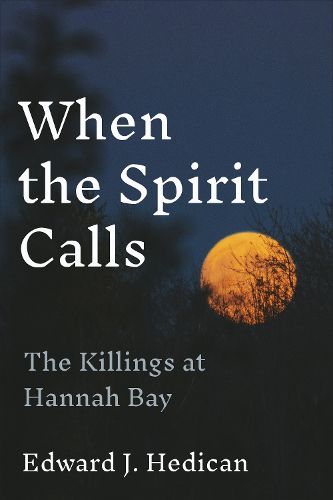Readings Newsletter
Become a Readings Member to make your shopping experience even easier.
Sign in or sign up for free!
You’re not far away from qualifying for FREE standard shipping within Australia
You’ve qualified for FREE standard shipping within Australia
The cart is loading…






In January 1832, in the most southern part of Ontario's James Bay, an elderly Cree man by the name of Quapakay was told by the spirits of the shaking tent that in order to survive the winter, he was required to "spoil" the post at Hannah Bay, a Hudson's Bay Company goose hunting station. Following the directions of the spirits, Quapakay and his sons carried out this ill-fated task, resulting in the deaths of sixteen occupants of the Hannah Bay post. Now known as the "Hannah Bay Massacre," the victims included fur trader William Corrigal, the postmaster and his wife, and seven other Indigenous people.
When the Spirit Calls explores the social, cultural, and historical context in which the Hannah Bay tragedy took place, as gleaned from the Hudson Bay Company's archival records and elucidations by Cree oral traditions. The research is the culmination of over forty years of investigation by Edward J. Hedican in Indigenous communities, from the mid-1970s to the present day. In the book, Hedican aims to uncover the circumstances, behaviours, and attitudes that led to the slaughter. When the Spirit Calls sheds light on the racist attitudes held by the white settler population towards Indigenous people attitudes that were prevalent in our colonial past and that continue to this very day.
$9.00 standard shipping within Australia
FREE standard shipping within Australia for orders over $100.00
Express & International shipping calculated at checkout
In January 1832, in the most southern part of Ontario's James Bay, an elderly Cree man by the name of Quapakay was told by the spirits of the shaking tent that in order to survive the winter, he was required to "spoil" the post at Hannah Bay, a Hudson's Bay Company goose hunting station. Following the directions of the spirits, Quapakay and his sons carried out this ill-fated task, resulting in the deaths of sixteen occupants of the Hannah Bay post. Now known as the "Hannah Bay Massacre," the victims included fur trader William Corrigal, the postmaster and his wife, and seven other Indigenous people.
When the Spirit Calls explores the social, cultural, and historical context in which the Hannah Bay tragedy took place, as gleaned from the Hudson Bay Company's archival records and elucidations by Cree oral traditions. The research is the culmination of over forty years of investigation by Edward J. Hedican in Indigenous communities, from the mid-1970s to the present day. In the book, Hedican aims to uncover the circumstances, behaviours, and attitudes that led to the slaughter. When the Spirit Calls sheds light on the racist attitudes held by the white settler population towards Indigenous people attitudes that were prevalent in our colonial past and that continue to this very day.